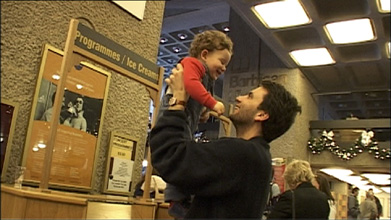Asher de Bentolila Tlalim
Israel 2003

|
CinemaxX 3 10.02.2003, 12:45 |
Produktion: Asher de Bentolila Tlalim,
Weltvertrieb: Ronit Yoeli Tlalim
Tel./Fax: (44 20) 73 87 45 09
E-mail: galoot2003@yahoo.com
Buch, Kamera: Asher de Bentolila Tlalim
Musik: Gilad Atzmon, Tom Tlalim
Ton: Tom Tlalim
Schnitt: Ida Bregninge, Sasha Olswang,
Asher de Bentolila Tlalim
Format: Digi Beta PAL, Farbe
Länge: 158 Minuten, 25 Bilder/Sek.
Sprachen: Hebräisch, Englisch, Arabisch
Galoot (exile in Hebrew) is a kind of intimate saga that touches the seeds of the pain and tragedies transformed nowadays into the embittered Palestinian-Israeli conflict. Being temporarily exiled from his homeland allows an Israeli filmmaker to see the conflict in a new and provocative way. Through his Palestinian and Israeli friends and through his and his wife’s personal stories, Galoot provides a reflective journey through homes and deserted homelands in Israel, Palestine, Poland, Morocco and England. ”Since the beginning of the Al Aksa intifada two years ago, the lack of mutual understanding on both sides and the blindness to the other side’s suffering has only been growing. Hence the despair and the urgency for any kind of dialogue. There, in Israel, everyone seems to be preoccupied with security issues and retaliations. Caught up with the pain and effort of survival, there is hardly anyone who is able or who wishes to raise his eyes and observe the situation from a broader perspective: looking at the ‘Palestinian enemy‘ not only as a cruel suicide bomber but also as a desperate person. For us, Israelis living far from home these days, this is a unique opportunity to meet Palestinian friends, to discuss our tragedies, to open our horizons and to express the need for direct contact and compassion towards the ‘enemy’ for transmitting a message of hope and a better future.” Asher de Bentolila
Tlalim Asher de Bentolila Tlalim, geb. 1950 in Tanger. Filmstudium in Ramat Gan, Kunst- und Architekturstudium in Jerusalem. Filme seit 1974: Don’t Touch My Holocaust (Forum 1994), Violence in Art (1995), Between the Carob and the Olive Tree (1998).